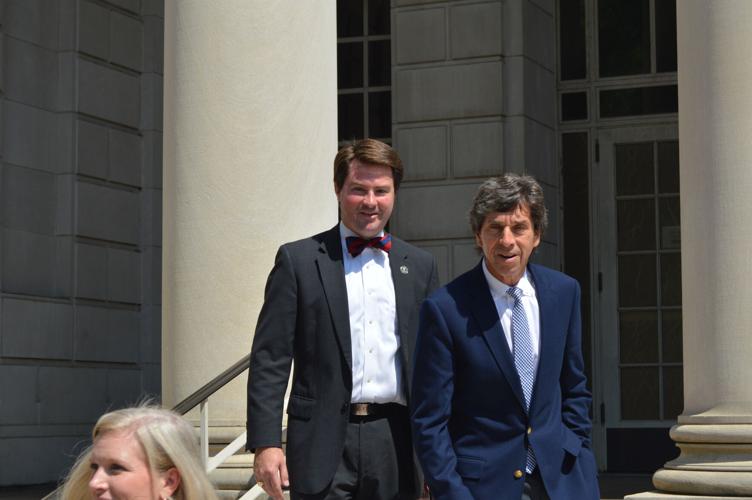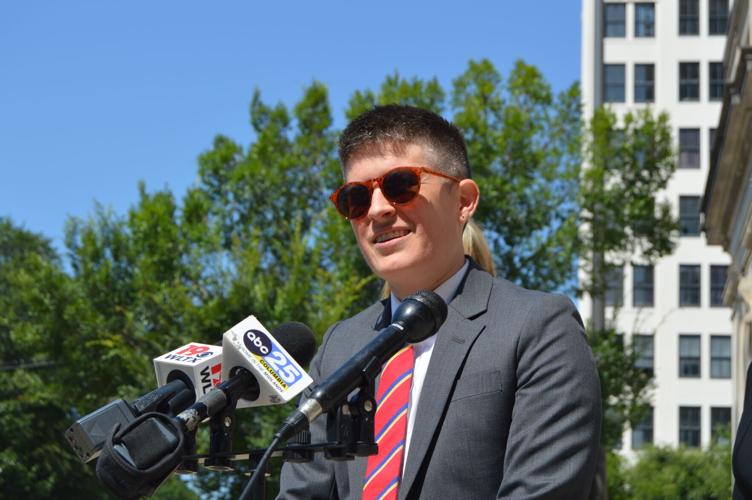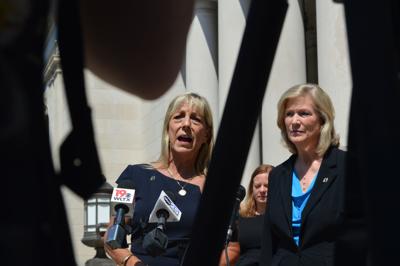COLUMBIA — Whether the state Supreme Court allows South Carolina's latest six-week abortion ban to take effect could come down to how well the Legislature's Republican leaders interpreted one justice's opinion.
That, and how much weight the high court gives its five-month-old ruling from the first go-round.
Justices are again deciding the constitutionality of a law that bans abortions in South Carolina roughly six weeks into a pregnancy. Abortions remain legal in the state through 5½ months — pending their decision.
Arguments June 27 before the now all-male panel focused on whether justices' January decision set a legal standard to follow and what exactly Justice John Few meant in his separate opinion. Legislators' attorneys argued they addressed his concerns.
But the attorney for abortion providers argued the decision this time should be the same because the law is the same, despite tweaks in the wording.
"My clients are back here today because the General Assembly ignored the court's ruling and enacted a nearly identical law," said Catherine Humphreville, a New York attorney representing Planned Parenthood and the Greenville Women's Clinic, which run the three clinics providing abortions in the state.
Attorneys for GOP lawmakers started the hearing by emphatically declaring the justices' 3-2 splintered decision from January did not set a precedent. Because each of the five justices wrote separate opinions explaining their reasoning, the decision did not "establish a rule of law," said Thomas Hydrick with the state attorney general's office.

Grayson Lambert, senior legal counsel for Gov. Henry McMaster (left), leaves the South Carolina Supreme Court after arguing to uphold the state's 6-week abortion ban on Tuesday, June 27, 2023. Alexander Thompson/Staff
Chief Justice Don Beatty interrupted him almost immediately, saying the majority agreed six weeks was insufficient for a woman to know she's pregnant and act on that knowledge.
Hydrick disagreed, igniting a back-and-forth exchange on what Few did or didn't say in his opinion that agreed with the conclusion but not the rationale.
"I think he expressly declined to go that far," Hydrick said.
"Oh, really?" Beatty interjected incredulously before quoting Few's opinion back to Hydrick.
Few declined to settle the dispute from the bench, saying people are free to their own interpretations.
But he did launch into a series of questions of whether women could exercise choice by taking over-the-counter pregnancy tests. Since it's possible for a test to confirm pregnancy hormones even before a missed period, is six weeks sufficient for women proactively testing themselves, Few asked.
"I think it's a valid notion that the state as part of its policy judgment can say, 'We want you to start thinking about your choices early rather than waiting to essentially get hit in the head with a two-by-four when you find out passively you're pregnant,'" Few told Humphreville.
"Right? Right? That's got to be right," he continued. "My question is very simple and I'm sorry to repeat it because it has an absolutely obvious answer. That is, on average, those who don't do pregnancy testing are going to learn they're pregnant later than those who do."
That's not practical, abortion providers' attorneys said, particularly since menstrual cycles can be very irregular, contraceptives can fail, and tests can be faulty when taken too early. They called it especially unrealistic for victims of rape or incent.
Beyond that, they said, whether a woman regularly takes pregnancy tests doesn't matter to the legal question of whether the law violates privacy rights.
The law seeks to ban abortions, with limited exceptions, once an ultrasound detects cardiac activity, which can occur around the sixth week of pregnancy.
Justice George James, a dissenting voice in January, called it a "pro-choice" law.

Catherine Humphreville speaks on the S.C. Supreme Court steps Tuesday, June 27, 2023. File/Alexander Thompson/Staff
"That's what it is," he said after Humphreville seemed to be taken aback. "The woman has a choice up to a certain point."
Few and Beatty, who were part of the three-justice majority five months ago, did most of the questioning during the hearing.
Missing was Justice Kaye Hearn, who wrote the lead opinion for Round One but then had to retire due to South Carolina's mandatory age limit for judges. Her conclusions came as no surprise, based on her questions during last fall's hearing. She even seemed to be trying to improve abortion providers' arguments.
Her replacement, Justice Gary Hill, offered no such window into his thinking.
The GOP-dominated Legislature elected Hill to the bench a month after the prior verdict put new scrutiny on the three-judge race. All three were deemed highly qualified and sat together on the Court of Appeals. But Republicans backing Hill said he seemed to be more conservative than his two female competitors, who officially dropped out almost as soon as the race legally started.
Hill said little from the bench June 27, other than asking Humphreville how the law fell outside the "zone of reasonableness." The constitutional section in question bans unreasonable invasions of privacy.
“Justice Hearn definitely noticed the gender composition in the courtroom," Humphreville told reporters after the hearing. "But at the end of the day, it’s for any justice to evaluate the case regardless of their gender and determine whether the abortion ban is unconstitutional."
Justice John Kittredge, whose dissenting January opinion vehemently disagreed with his colleagues, said the new law necessitates a fresh look at the arguments. Even if the January ruling could be considered precedent, one opinion is not enough to set legal standards, he said.
"It's not the end-all, be-all you're suggesting it is," he told Humphreville, adding, "We could never have a situation where precedent ties our hands indefinitely."
In January, he stressed that the reason abortion is before the state Supreme Court at all is because the U.S. Supreme Court threw out Roe v. Wade last summer, overturning nearly a half-century of precedent in returning the legality to state legislators. He concluded then the decision is entirely the Legislature's.
There is no timetable for the high court to rule on the new law. The January ruling came less than three months after justices heard arguments and just days before the start of the 2023 legislative session.
That session concluded earlier this month. Legislators don't expect to return to chambers until Jan. 9, 2024.
No matter what justices decide, the debate over banning abortions in South Carolina is certain to continue.
"Ultimately, the primary check on the General Assembly's regulation of abortion is the ballot box," Gov. Henry McMaster's attorneys wrote last week in a pre-hearing brief. "It is up to the voters to have the final say on the 2023 act at the next general election."
Alexander Thompson contributed to this report.









